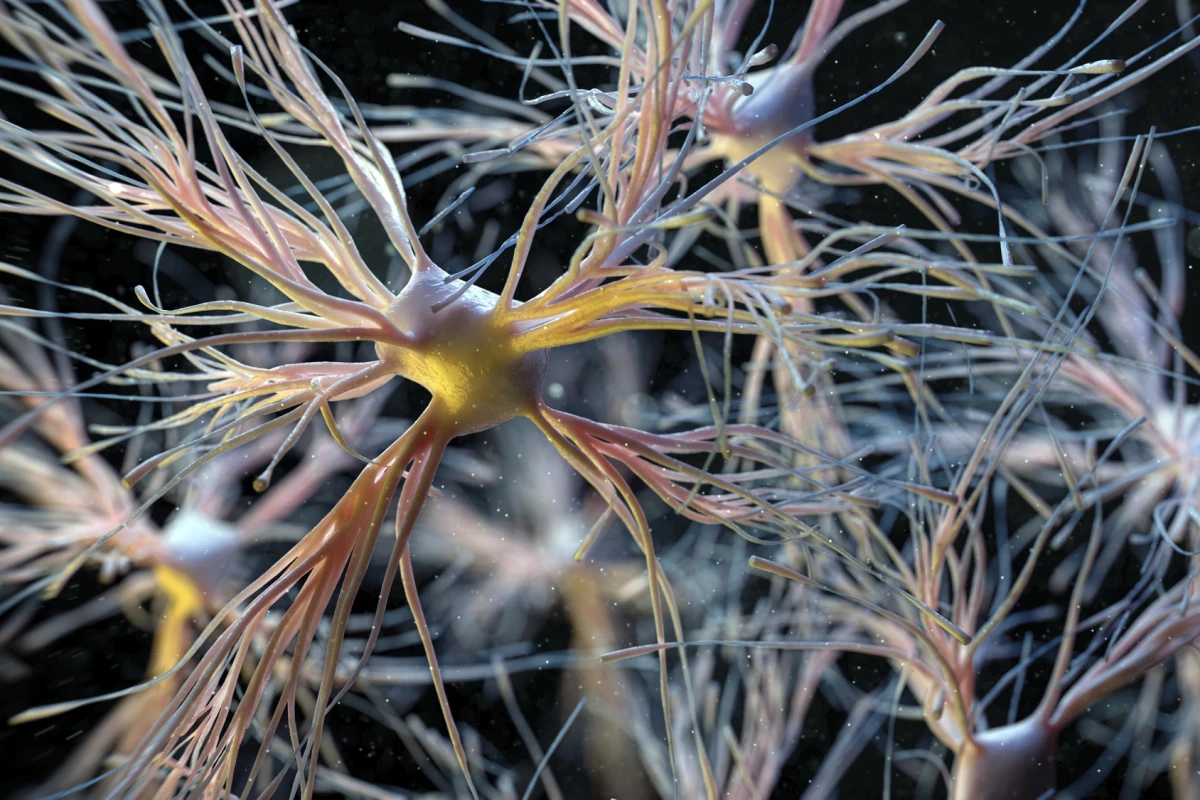Researchers have transplanted cells capable of forming specialized brain support cells into mice brains and found that they not only competed with and replaced unhealthy cells but aged ones, too. The findings open the door to developing an effective treatment for a range of conditions like multiple sclerosis, ALS, Alzheimer’s disease, autism and schizophrenia.
‘Glial cells’ is an umbrella term for the cells that are a support system to nerve cells (neurons). Progenitor cells are descendants of stem cells that can differentiate into specific cell types, and, in the case of glial cells, human glial progenitor cells (hGPCs) differentiate into subtypes, including astrocytes and oligodendrocytes, specialized for particular functions.
Astrocytes comprise most of our central nervous system cells, providing support and protection for neurons, transporting nutrients and removing waste. Oligodendrocytes lay down and maintain the lipid-rich, insulating wrapping called myelin around some axons, the part of the neuron that connects with another neuron and allows the transmission of nerve impulses.
Dysfunctional astrocytes and oligodendrocytes have been associated with several neurodegenerative and neuropsychiatric conditions. Given the ability of hGPCs to give rise to new astrocytes and oligodendrocytes, researchers from the University of Copenhagen, Denmark, have examined how transplanting healthy hGPCs might help restore brain function.
The researchers had previously demonstrated that healthy human glial cells replaced unhealthy mouse glial cells when transplanted into mouse models of Huntington’s disease, a rare and fatal inherited disease that causes progressive neuronal breakdown.
In the current study, they wanted to see whether healthy human cells could replace diseased human cells. So, they introduced healthy hGPCs to ‘chimeric’ mice that had been injected with stem cells derived from humans with Huntington’s disease. The researchers found that the healthy cells overtook and completely replaced the diseased ones.
“We transplanted the healthy human cells into the mice that were ‘humanized’ with the mutant Huntington-expressing glia, and the healthy glial cells outcompeted and replaced the diseased glia, actually eradicating the diseased glial population,” said Steven Goldman, corresponding author of the study.
Interestingly, the researchers found that when the younger donor hGPCs were introduced into the brains of the humanized mice, they competed with and replaced healthy, non-diseased but aged cells. The researchers say that their findings that healthy hGPCs replaced both diseased and aged cells are significant, highlighting the potential for developing treatments that could be used in a broad range of scenarios.
“That told us that it wasn’t just a question of healthy cells outcompeting the diseased cells of Huntington’s disease, but that this was much broader in terms of its potential use, because we could go into all sorts of disease targets where we have older or diseased glial populations,” Goldman said. “The advantage is significant in terms of where this could go because there are all sorts of diseases of glial cells.”
Glial cells are critical to the development of certain neuropathologies. The neurodegenerative conditions amyotrophic lateral sclerosis (ALS), otherwise known as Lou Gehrig’s disease, epilepsy, multiple sclerosis (MS), Parkinson’s disease, and Alzheimer’s disease, have been associated with dysfunctional glial cells. As have neuropsychiatric disorders, autism spectrum disorder (ASD), bipolar disorder and schizophrenia.
“If we can replace the diseased and aged cells, then we should be able to restore aspects of normal function in these degenerative diseases, as we have seen with our experimental models of Huntington’s disease,” said Goldman. “But that’s basically a proof of principal because we think the same thing would work in some of these other diseases as well. In ALS, some of the frontotemporal dementias, and even in some of the hereditary schizophrenias, as well as in the myelin diseases and age-related white matter loss.”
The researchers are proposing to conduct clinical trials to test the effectiveness of hGPC transplantation in Huntington’s disease and two other diseases: primary progressive multiple sclerosis (PPMS) and Pelizaeus-Merzbacher disease (PMD). Whereas most people with MS have bouts of relapse followed by remission, about 15% have PPMS, where the disease progresses relentlessly without periods of remission. PMD is a rare, progressive genetic disorder that damages oligodendrocytes, leading to deteriorating coordination, motor ability and cognitive function.
The researchers hope to reach human clinical trials within the next couple of years.
“Things are fairly far along,” Goldman said. “We still need to be absolutely sure of the long-term safety of the cells after we transplant them. But we are expecting to have that data in about a year and a half. At that point, we hopefully can get approval to go into patients, so I would hope that we could initiate trials of this approach within two years from now.”
The study was published in the journal Nature Biotechnology.
Source: University of Copenhagen via EurekAlert!





